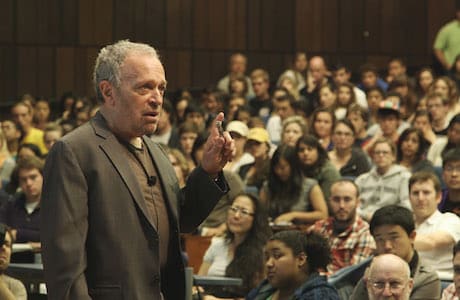"If you have ten million dollars, then why do you need the little bit that I have?"
The question, posed in earnest by a disenfranchised worker to her wealthy employer in Jacob Kornbluth's Inequality For All, is one that many in the middle class find themselves asking some variation of these days. The inciting and informative documentary uses startling graphics and figures, first-hand accounts from the front lines and a wonderfully articulate guide, in former U.S. Secretary of Labor Robert Reich, to thoroughly dissect the causes and effects of the widening gap between the extravagantly rich and those who struggle to make ends meet.
Born with a condition known as Fairbank's Syndrome, which has left him stuck at well under five-feet tall, Reich is the ideal person to discuss the plight of the low man on the totem pole. Whether it's a peek into the class he teaches at the University of California Berkeley or addressing the camera directly with his ideas, he makes a persuasive case about how and when the troubles began. Much like back in the '20s, the mid-'70s saw the rich starting to get richer at a disproportionate rate to the working class, thanks to myriad factors, including partisan politics, globalization and an alarming amount of good, old-fashioned greed.
To help illustrate how the complexities of the issues actually manifest themselves in the real world, there are a few profiles of families living with modest incomes and under a mountain of debt — even some with members studying in Reich's classroom. One household's story shows how the decline of unions is allowing workers to be more easily exploited by companies looking to stay competitive. On the other side of the equation is a look at the CEO of a pillow company who, as a member of the one percent, recognizes that he can spend only so much of what he earns and how the growing inequities negatively impact the economy as a whole.
Through it all is the fascinating figure of Reich, lamenting that he didn't do more to remedy the problems while serving during Clinton's presidency and puzzling over how many of his conservative allies have now given him the cold shoulder and branded him a communist. Leaning on his closing speech to his students on the final day of class, the film attempts to adopt a hopeful tone at the end to help inspire some confidence that the task of turning the tide isn't an insurmountable one.
It's to the film's credit then — doing its job almost too well — that after miring itself in all of the shady business of lobbyists and housing bubbles, it can't help but feel like it's still too hard to be optimistic about the direction things are heading.
(eOne)The question, posed in earnest by a disenfranchised worker to her wealthy employer in Jacob Kornbluth's Inequality For All, is one that many in the middle class find themselves asking some variation of these days. The inciting and informative documentary uses startling graphics and figures, first-hand accounts from the front lines and a wonderfully articulate guide, in former U.S. Secretary of Labor Robert Reich, to thoroughly dissect the causes and effects of the widening gap between the extravagantly rich and those who struggle to make ends meet.
Born with a condition known as Fairbank's Syndrome, which has left him stuck at well under five-feet tall, Reich is the ideal person to discuss the plight of the low man on the totem pole. Whether it's a peek into the class he teaches at the University of California Berkeley or addressing the camera directly with his ideas, he makes a persuasive case about how and when the troubles began. Much like back in the '20s, the mid-'70s saw the rich starting to get richer at a disproportionate rate to the working class, thanks to myriad factors, including partisan politics, globalization and an alarming amount of good, old-fashioned greed.
To help illustrate how the complexities of the issues actually manifest themselves in the real world, there are a few profiles of families living with modest incomes and under a mountain of debt — even some with members studying in Reich's classroom. One household's story shows how the decline of unions is allowing workers to be more easily exploited by companies looking to stay competitive. On the other side of the equation is a look at the CEO of a pillow company who, as a member of the one percent, recognizes that he can spend only so much of what he earns and how the growing inequities negatively impact the economy as a whole.
Through it all is the fascinating figure of Reich, lamenting that he didn't do more to remedy the problems while serving during Clinton's presidency and puzzling over how many of his conservative allies have now given him the cold shoulder and branded him a communist. Leaning on his closing speech to his students on the final day of class, the film attempts to adopt a hopeful tone at the end to help inspire some confidence that the task of turning the tide isn't an insurmountable one.
It's to the film's credit then — doing its job almost too well — that after miring itself in all of the shady business of lobbyists and housing bubbles, it can't help but feel like it's still too hard to be optimistic about the direction things are heading.
